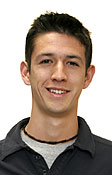
Illustration by Mike Padilla
|
|
By Damion LeeNatali
Arizona Daily Wildcat
Friday, February 25, 2005
Print this
Facing a tight job market and unprecedented competition, today's college students are pressured more than ever to succeed in a world that won't always let them. But straining to achieve a lofty post-graduate goal, be it an enviable corporate post or an elusive spot at a prestigious school of law or medicine, can be detrimental.
It's no secret that many contemporary college students are increasingly ambitious. Ohio State University, held by The New York Times to be "emblematic" of college campuses nationwide, recorded a 30 percent jump in the rate of students graduating with double majors last year. And in a trend that should come as no surprise to campus job recruiters, a survey by Experience Inc. indicates that 64 percent of graduating students this year will have held at least one internship, a full 12 percent more than one year ago.
But while it's apparent that students are increasingly zealous both in their course loads and in their resume building, the pressures that fuel such behavior often evade clear description. Christopher Dang, a political science senior and president of the Phi Alpha Delta pre-law fraternity, partially faults students' preconceived notions. "I think that there's a stereotype of what professional schools are looking for," he observed, noting that students often try to tailor themselves to fit that mold.
 |
|
Mug Damion LeeNatali
Columnist
|
|
|
Although it would be hard to quantify Dang's assertion, it isn't difficult to see how such a trend could develop. In the last three years, top-ranked Yale Law School admitted only 174 of the 357 applicants that had grade point averages above 3.75 and LSAT scores above 175. If Yale admits only 49 percent of students with such impressive academic credentials, students who want to attend similarly prestigious institutions could hardly be blamed for their pronounced sense of ambition.
Of course, ambition can be taken too far, especially if a student is in danger of becoming "hyperfocused." Hyperfocus can take many forms, but it seems that it is most often manifested in narrow course selection (in which courses are chosen in the interest of maximizing GPA more than achieving well-roundedness) and unapologetic resume padding (in which extracurricular activities are seen more as a necessary evil than an experience to be enjoyed).
While such practices may seem to comply with the modus operandi of college life, hyperfocus is at its most malignant when a student's pursuit of a towering goal begins to eclipse the full breadth of all that college has to offer. Indeed, the defining characteristic of all hyperfocused
students is that the true joys of college are lost to them amid the cacophony of their extracurricular commitments, heavy course loads and resume building.
Taken in this light, hyperfocus seems less attractive, but what most students fail to understand is that it's also unnecessary. Theresa Craw, the assistant director of admissions at the Eller College of Management, admits that "the market is pushing specialization," which may account for students that feel the need to hyperfocus. But she also emphasized the fact that admissions personnel at graduate and professional schools look beyond grades and résumés to see if a candidate has "taken time out to do something as a human being."
Terry Holpert, the assistant dean of admissions at the UA's James E. Rogers College of Law, took a different tack. While she regarded the notion of hyperfocused students as "anecdotal empiricism," Holpert did note that student misunderstandings abound. "The thing I notice is students not accessing the institution appropriately - not reading the materials through, not doing the research, and assuming that there's a defined script (for gaining admission) when there isn't one," Holpert asserted.
A misinformed pursuit of perfection, then, seems to be deemed by admissions personnel and administrators as both unnecessary and unwise. But to try to communicate that to a hyperfocused student, who is by definition a serial overachiever, doesn't seem particularly helpful either. Instead, students should try to expand their sphere of experience in the interest of self-reflection and enjoyment.
Taking courses outside of degree requirements may be difficult, and joining a fun extracurricular club that doesn't look as impressive on a resume may seem foolish, but both will serve to underscore what Craw described as "distinguishing characteristics" that are most useful to admissions personnel and future employers.
So hyperfocused students would do well to take some time to learn about, well, themselves. The real world, with all its competition, stress and worry, will most certainly be there when they get back.
Damion LeeNatali is a political science and history sophomore. He can be reached at letters@wildcat.arizona.edu.
